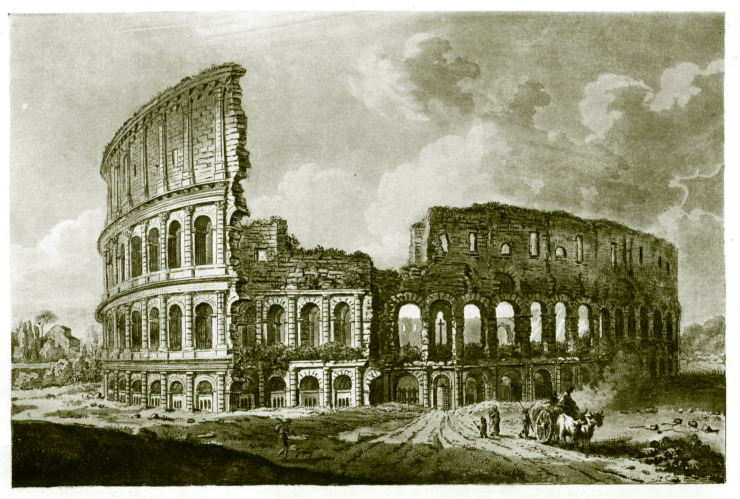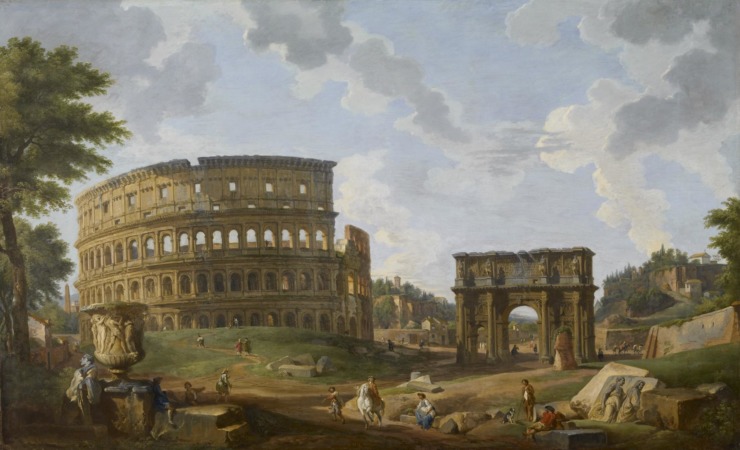< Return to Edgar Allan Poe Poems
To Coliseum
Type of the antique Rome! Rich reliquary
Of lofty contemplation left to Time
By buried centuries of pomp and power!
At length—at length—after so many days
Of weary pilgrimage and burning thirst,
(Thirst for the springs of lore that in thee lie,)
I kneel, an altered and an humble man,
Amid thy shadows, and so drink within
My very soul thy grandeur, gloom, and glory!
Vastness! and Age! and Memories of Eld!
Silence! and Desolation! and dim Night!
I feel ye now—I feel ye in your strength—
O spells more sure than e’er Judæan king
Taught in the gardens of Gethsemane!
O charms more potent than the rapt Chaldee
Ever drew down from out the quiet stars!
Here, where a hero fell, a column falls!
Here, where the mimic eagle glared in gold,
A midnight vigil holds the swarthy bat!
Here, where the dames of Rome their gilded hair
Waved to the wind, now wave the reed and thistle!
Here, where on golden throne the monarch lolled,
Glides, spectre-like, unto his marble home,
Lit by the wan light of the horned moon,
The swift and silent lizard of the stones!
But stay! these walls—these ivy-clad arcades—
These mouldering plinths—these sad and blackened shafts—
These vague entablatures—this crumbling frieze—
These shattered cornices—this wreck—this ruin—
These stones—alas! these gray stones—are they all—
All of the famed, and the colossal left
By the corrosive Hours to Fate and me?
“Not all”—the Echoes answer me—”not all!
Prophetic sounds and loud, arise forever
From us, and from all Ruin, unto the wise,
As melody from Memnon to the Sun.
We rule the hearts of mightiest men—we rule
With a despotic sway all giant minds.
We are not impotent—we pallid stones.
Not all our power is gone—not all our fame—
Not all the magic of our high renown—
Not all the wonder that encircles us—
Not all the mysteries that in us lie—
Not all the memories that hang upon
And cling around about us as a garment,
Clothing us in a robe of more than glory.”
—Edgar Allan Poe
Enjoy Artistic Representations of “The Coliseum” by Edgar Allan Poe

Aquatint engraving executed from a drawing made on the spot, 1798.

Giovanni Paolo Panini’s view of the Colosseum and the Arch of Constantine is a somewhat fanciful reconstruction showing each monument from its best side, 1747.
Listen to Readings of “The Coliseum”
Listen to this Musical Interpretation of “The Coliseum” by Edgar Allan Poe
That’s it for readings of The Coliseum by Edgar Allan Poe!
About Edgar Allan Poe
Edgar Allan Poe (1809-1849) published his first collection of poems, Tamarlane, and Other Poems, in 1827, when he was 18 years old. A tendency to run up debts (including for gambling) kept him in constant state of reinvention – college student, poet, short story writer, soldier/officer school, literary journal editor and critic.
The Poe who arises from Symons’ hand (his biographer in The Telltale Heart: The Life and Works of Edgar Allan Poe) is a man who first and foremost was determined to put Southern letters on the map, aiming to wrest control from the literary establishment in New York and New England (Poe aimed some rather pointed arrows at writers like Henry Wadsworth Longfellow). For his own writing, he wanted to be considered a poet. The poems were the important works; the stories were almost after-thoughts, almost dashed off primarily to raise funds. And he always needed money.
His personal life seemed to have stayed a general mess, but he had an enormous impact on both American and world literature. Consider the stories and poems that have been filmed, published, re-published, anthologized, celebrated and widely admired for more than 150 years: “Murders in the Rue Morgue,” “Fall of the House of Usher,” The Raven, “The Tell-Tale Heart,” Annabel Lee, “The Bells,” “Ulalame,” “To Helen.”
We associate Edgar Allan Poe with 19th century gothic. His stories are full of mystery, passion, horror, violence, death, and the supernatural. And yet his poems, especially “The Raven” and “Annabel Lee,” made him famous in pre-Civil War America and established his literary reputation.
Questions and mystery surrounded Poe’s own life and death, and continue even today – we may never know who left three roses and a bottle of cognac on his grave in Baltimore for decades until 2011 (alas, the “Poe Toaster” disappeared or died, to be seen nevermore).
You can read more about Poe’s biography in the articles Poets and Poems: Meeting Edgar Allan Poe and Forgotten Classics, The Telltale Heart by Julian Symons by Glynn Young, from which this biography was compiled.
I hope you enjoyed The Coliseum by Edgar Allan Poe!
BUY ‘HOW TO WRITE A FORM POEM’ NOW!
